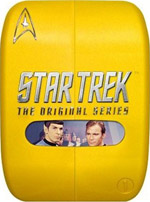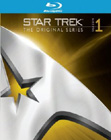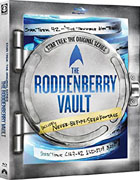
STAR TREK:
- The Original Series (TOS)
- The Animated Series
- The Movies
- The Next Generation (TNG)
- Deep Space Nine (DS9)
- Voyager
- Enterprise

THE ORIGINAL SERIES:
- Season One
- Season Two
- Season Three
- "Season Four"
Season One:
-1: "The Cage"
-2: "Where No Man Has Gone Before"
-3: "The Corbomite Maneuver"
-4: "Mudd's Women"
-5: "The Enemy Within"
-6: "The Man Trap"
-7: "The Naked Time"
-8: "Charlie X"
-9: "Balance of Terror"
-13: "The Conscience of the King"
-16: "The Menagerie"
-20: "The Alternative Factor"
----: _Time Travel Season 1
-21: "Tomorrow is Yesterday"
----: _Prime Directive Origins
-22: "The Return of the Archons"
-23: "A Taste of Armageddon"
-27: "Errand of Mercy"
-28: "The City On the Edge of Forever"
-29: "Operation -- Annihilate!"
-Season 1 Rankings

SCIENCE FICTION:
- Doctor Who
- Sliders
- The Matrix

- Main Index
- Site Map
|
Operation -- Annihilate!
(Star Trek story #29 in production order)
- written by creative consultant Steven W. Carabatsos
- directed by Herschel Daugherty
- tracked music by Courage / Steiner / Kaplan / etc.
|
|
|

Operation -- Annihilate!
Of the stories that conclude each season of original Star Trek,
this is the one that most feels like a season finale, the one
where Kirk and company are most put to the test to save countless
Federation colonies from a very strange sci-fi unknown. In that sense,
it's the right idea, and it was fairly well done here. However
it contains a few missteps as well, and doesn't quite fulfill its
larger potential. As a result, the story ends up being far less celebrated
than it deserved.
After all the dystopias and sociology-based stories appearing
on Trek in recent episodes, it is actually quite refreshing to get
drawn into the heavily science-based exploration that is showcased
in this episode - which is done to such a degree that the adventure
feels like it would be even more at home on
"The Next Generation" (TNG).
It's great to see that The Original Series (TOS) can tackle this
kind of story just as well. In fact, this adventure is quite
reminiscent of some of TNG's better-liked early story lines, such
as "Conspiracy", or the developing Borg threat, featuring some
different mechanisms for humanoid take-over and a collective intelligence.
Additionally, this story features some
exceptional location work, making the rare sight of a well-established
Human colony feel both real, and also attractive as a place to live.
And the story will get a point for burning some very memorable imagery
into our brains. Who can forget that this is the one that featured
those weird leeches hanging under an arch? Yick! The budget may have
been limited, but they get a good effect by combining squelchy protesting
sounds with close-ups of a pulsating leech prop, by showing that they will
come at you like bats without necessarily knowing where they're going,
and especially by Leonard Nimoy's superb acting demonstrating what happens
when one lands on your back. Perhaps the coup-de-grace is the
description McCoy gives of its effect on a person's nervous system,
along with the "sample" he brings along in a jar. All quite effective.
An Important First, Nearly Neutered
Two moments really stand out, one being superbly effective,
one being stunningly daft. The effective moment is the one where
Kirk has a really crappy dilemma put in front of him, one in which
he may have to sacrifice a colony of 1000 people, including two
that are very close to him personally, to save countless other colonies.
This is the first Star Trek story to show an optimistic problem-solving
captain banging his fist down on the conference table, making clear
to his subordinate officers that he wants another option. He's setting
a refreshingly higher standard here. And ask and you shall receive.
Though I associate this type of brilliance much more readily with
Captain Picard of TNG, it's a glorious thing to see Kirk step up to the plate
and deliver it here. And another important Trekkian staple is born.
However, it nearly becomes a still-birth as our daft moment later comes
along. Against Dr. McCoy's better judgment, our characters decide to
test their leading theory on Mr. Spock, in such a manner as to blind
the man. Two minutes later, a completely different set of results
from an autopsy reveals how unnecessary the blinding was. The real
daftness is just how Kirk and Spock thought they should be so risky
instead of waiting a few minutes for the lab autopsy reports. What was
the rush? There is a bit of an implied ticking clock, in terms of
how quickly the colonists might be forced to build spacecraft to
move the creatures to their next colony, but nothing here suggests
that that wouldn't have taken weeks. Really, what was the big rush?
Well, we can guess why that scene plays out in such a manner.
It feels as though writer Steven W. Carabatsos has not been quite enough
of an architect in his writing style. Instead he's been too much of a
"gardener", where story development shapes itself as you write. It feels
as though he didn't really know where he was going with this, and had planned
no high energy climax, no action-adventure final challenge in implementing
the winning solution. His excellent scientific problem-solving angle
simply keeps on going and going, in search of some kind of drama
worthy of the actors' skills. Sadly, by settling on a foolishly
unnecessary (and of course temporary) blinding of Mr. Spock,
the story's conclusion ends up centering on something that
feels completely contrived, as though they'd run out of ideas. Not good.
Now mind you, the script still manages to milk this for some worthy
character moments, and our three lead actors do remarkably well with
the material. In addition, we get some quite satisfactory effects
as the colony is saved, and which turn out to be something a little
unusual for Star Trek in both its look and its feel as a conclusion.
Not bad.
The story is strange in another notable respect, in that it looks
at first like it is set to be really good as a people story,
before it short-changes itself and becomes anything but. Most notably,
it seems the entire regular and semi-regular crew are in this one.
All six big stars of the show, including Scotty, Uhura, and Sulu,
make significant appearances. Additionally, Nurse Chapel finally
returns after her two establishing episodes to make her
strangely delayed third appearance... and she gets quite a bit
of important stuff to do in the later stages of this one. All good.
Eddie Paskey's character of Leslie gets lots of screen time, performing
well as Spock gives him the ol' neck pinch. And our Yeoman-of-the-week
is an Asian woman, probably playing yet another role originally written
for Janice Rand, a role big enough to tempt us to believe she might
start to recur in further episodes. As with previous Yeomen-of-the-week
this season, no such luck.
The real gaff is that this story picks up on a nice little detail
about Kirk's family mentioned
back in episode 10 "What Are Little Girls Made Of?",
and then it takes the opportunity to cast on screen
roles for Kirk's brother Sam, and Sam's immediate family... only to do
very little with them, and curtail any possibility of anyone doing
anything with them in the future. In the end, Sam is played
by an extra, as a corpse, which is hugely disappointing.
His son Peter remains unconscious all story long, and is never seen
again on Star Trek. WEIRD! At least Kirk's sister-in-law has
a lot to say, but sadly much of her screentime is dominated by
hysterics of one sort or another. Yes, the story gets some mileage
from seeing this happen to a family that Kirk is very much attached to,
but I don't think this story did enough good things with these people
to warrant their introduction and casting, and curtailed the continuation
of characters that could have really deepened the show and its universe
over the long term. Sad.
In fact, the appearance of any of the colonists ends up being a bit too
sparse in the end. We get a handful of random attackers on the
location footage, which works great, but it feels really strange that
we get nothing else at any other point. A few other speaking roles
for some important colonists might have re-balanced this story
quite nicely. How about someone from the colony's biology labs
with some info? How about a lead villain, or spokesperson for
the creatures' wishes?
Adding characters to the colony seems to be an obvious source
for some of the higher-energy action-adventure beats that the
story's conclusion seems to be needing so badly. Or if perhaps
preserving the facelessness of the invasion was more important,
there are other ways as well.
Well, in the end I do like this story as is, and it seems to be
one of the better ones of the season. A few simple things here
and there could have brought it up a few notches more though,
so it is sad to see all those missed opportunities. Star Trek
still had a lot of good things in store for it, in the next season
and beyond. Roll on season two....
Rankings:
Best Story:
- The Cage
- This Side of Paradise (Splendid! This episode spoke to me
much more this time through than in previous years.
I like Spock's arc here better than that of
"The Naked Time", or the upcoming "Amok Time"...
In fact, there are lots of great moments
for everyone, including Kirk abandoned on the ship,
Uhura and Leslie committing mutiny, etc.
A lot of season 1 music cues
get their most definitive uses here as well, including
"Andrea" for the suspicious side of Lela, and "2nd Ruth"
for her relationship with Spock, plus Jack Cookerly's Talosian sound
for the spore plants. Plus the most gorgeous location filming
of season 1. A real winner.)
- The Corbomite Maneuver
(Granted, this is slow, but it otherwise
got everything else so right...)
- The Devil in the Dark (a sequence of story beats very similar to "Arena",
except that "high values" are not imposed by super beings,
but well up from within our Starfleet characters, which is
more organic and more deeply satisfying. It's also best that
the dialogue focuses on the two races' discoveries about each other's
life cycle, rather than clinical discussions of intangible
values, which "Arena" tripped up. Production values
range from hokey to outstanding, but good directing keeps
it working as well as could be hoped. Yes, quite good.)
- The Enemy Within
- Charlie X
- Errand of Mercy
[The Menagerie would place about here if it wasn't duplicate content]
- Where No Man Has Gone Before
- Balance of Terror
- The Squire of Gothos (a fascinating antagonist and an exciting,
varied battle of wits. Too bad Kirk didn't quite solve his own problem
though. The parents are believable, but their necessity
is a disappointment.)
- What Are Little Girls Made Of? (I like the astro-geology &
invented mythology discovered here.
Nurse Chapel has some weight thanks to "The Naked Time",
but performance is a bit flat for the quieter scenes.
Android flaws/thinking can
pass better as cultural idiosyncrasies rather than
psychological/computational absolutes.
I LOVE the music for this one!)
- A Taste of Armageddon
- Operation -- Annihilate!
- Arena (First half is pretty engaging, 2nd half falters.
Neither Coon nor his Metrons seem all THAT philosophically advanced.
Kirk really only overstepped his bounds by not seeking to
engage/police the Gorn verbally at any point.
Thus the Starfleet charter was discarded to facilitate the story.
Photon Torpedoes and their effect defined here and contrasted with phasers - good!
Production value is a plus.)
- Space Seed (Great performances, and an episode well made, but the
eugenics concept is a bit overrated. All those improvements
to strength and intelligence, and in the face of philosophical
wisdom Khan and company can't stop being total jerks? Come on.
Good that we get new model shots of Khan's ship alongside Enterprise,
but we're stuck on the Enterprise, no phasers firing,
using brute strength for ALL the action. Ho hum.
Episode contains first reference to transporters working as a
molecular reassembly project, as McCoy makes first complaint
about his atoms scattering. Also, the backstory would still be
plausible if only the dates weren't so specific and prolific,
mentioning the 1990's over and over again. And that would be
easier to forgive if Star Trek hadn't continued till 2005,
incorporating our 1990's into its backstory as well.)
- Dagger of the Mind (Neat ideas, but nothing profound to say at the end,
just straight action & unresolved infatuation/madness,
w. downbeat victory.)
- The Naked Time
- Mudd's Women
- The Menagerie
- Shore Leave (interesting idea, accelerating the Law of Attraction,
but it's a lackadaisical script that leaves the crew mostly
confused and distracted instead of proactively tackling a plot
and moving forward, with the audience invested in the outcome.
Thank goodness the location is gorgeous, and Fried's score is fun.)
- Court Martial (a dull idea, although quite well executed. But most
episodes of JAG feature more airtight mysteries and better legal cases.
Lots of nice bits, including Cogley's big speech(es), and
the heartbeat scene. Kirk's chair panel is ridiculous,
as is the concept of the "pod" in the first place.)
- Miri (very good idea - tugging an almost archetypal concept
of the childhood that never ends. [Peter Pan / Neverneverland]
Lots of good differentiation between children and grups
where cultural differences can take up extra slack,
but this story has a number of sloppy tangents in the script,
yakking away with technobabble concerning ye olde
disease of the week, or concerning this identical Earth's
measurements instead of some rationality for it.
We do get an upbeat ending - rare this early in the series.
This one's a tad clumsy, but okay.)
- The Man Trap
- The Galileo Seven (Launch shuttles! Fire Phasers!
I enjoyed this very much, but it committed a LOT of mistakes.
The time-pressured shuttle rescue concept is great,
but the situation's set-up didn't work at all,
astronomically, or logistically.
Astronomy should have stuck to "murasaki effect" [total invention]
and not "quasars" [contradicting what we now know].
Character material sometimes quite far-fetched, but
sometimes we get gold ["There are always alternatives."]
The opticals often salvage Gist's abysmal footage.
Why hold on such bad long shots? Intercut some close-ups
and lose the embarrassments!)
- The Alternative Factor
(a decent but limited idea, very sloppily told.
Writer can't find a natural way for information to come out
or be withheld.)
- The City on the Edge of Forever
(How did this one rank so low? Read
our full review here.)
- The Return of the Archons
(This has its good bits,
but far too much PAINFULLY retarded padding in between.)
- Tomorrow is Yesterday
- The Conscience of the King
Best Music:
- Fred Steiner: Charlie X
- Alexander Courage: The Cage (including the main Star Trek fanfare and theme)
- Sol Kaplan: The Enemy Within
- Fred Steiner: Mudd's Women
- Fred Steiner: Ruk's Drums.... or What Are Little Girls Made Of?
- Fred Steiner: The Corbomite Maneuver
- Alexander Courage: The Naked Time
- Gerald Fried: Shore Leave
- Fred Steiner: Balance of Terror
- Alexander Courage: Where No Man Has Gone Before
- Domenico Scarlatti / Johann Strauss Jr.: The Squire of Gothos
- Alexander Courage: The Man Trap
- Joseph Mullendore: The Conscience of the King
- Steiner/Campbell/Connelly/Noble/Hatch: The City on the Edge of Forever
- Uhura's songs
Best Directing:
- Robert Butler: The Cage
- Lawrence Dobkin: Charlie X
- Ralph Senensky: This Side of Paradise
- John Newland: Errand of Mercy
- Don McDougall: The Squire of Gothos
- Leo Penn: The Enemy Within
- James Goldstone: Where No Man Has Gone Before
- James Goldstone: What Are Little Girls Made Of?
- Joseph Pevney: The City on the Edge of Forever
- Joseph Pevney: The Devil in the Dark
- Joseph Sargent: The Corbomite Maneuver
- Vincent McEveety: Balance of Terror
- Herschel Daugherty: Operation -- Annihilate!
- Marc Daniels: The Menagerie
- Joseph Pevney: A Taste of Armageddon
- Joseph Pevney: Arena
- Robert Sparr: Shore Leave
- Vincent McEveety: Dagger of the Mind
- Marc Daniels: Space Seed
- Marc Daniels: Court Martial
- Marc Daniels: The Naked Time
- Harvey Hart: Mudd's Women
- Michael O'Herlihy: Tomorrow is Yesterday
- Joseph Pevney: The Return of the Archons
- Vincent McEveety: Miri
- Marc Daniels: The Man Trap
- Gerd Oswald: The Alternative Factor
- Gerd Oswald: The Conscience of the King
- Robert Gist: The Galileo Seven
Read the next Star Trek review:
"Catspaw"
|
|
"Operation -- Annihilate!" is available on DVD and Blu-Ray.
Click on the Amazon symbol for the desired disc format
and location nearest you for pricing and availability:
Star Trek Season One "Purist" Standard DVD Box Set:
|

|
Watch the legend develop from its infancy.
Set contains 29 episodes from the first season
in their original wacky broadcast order,
including "The Menagerie Parts 1 & 2" which used
footage from the original unaired pilot "The Cage".
However, "The Cage" itself is only included with
the Season Three Box Set.
As someone interested in researching how the episodes
actually looked and sounded originally, and when and
exactly how certain musical cues first debuted,
this was the DVD set for me, and it remains the most
untampered-with full-season collection of Star Trek
out there. Unique extras include pure text commentaries
on select episodes.
Sadly, these sets are starting to
become rare, and prices are now rising as these
become collectors' items....
|
DVD U.S.


| DVD Canada


| DVD U.K.


|
Standard DVD Extras include:
- original restored broadcast versions of the 29 episodes.
- "The Birth of a Timeless Legacy" documentary (24 min.)
- Text only commentary by Denise & Michael Okuda
on "Where No Man Has Gone Before",
"The Menagerie Parts 1 & 2",
and "The Conscience of the King".
- "To Boldly Go" featurette (19 min.) discussing
"The Naked Time",
"City on the Edge of Forever",
"The Devil in the Dark",
and "The Squire of Gothos".
- "Reflections on Spock" featurette (12 min.)
- "Sci-Fi Visionaries" writing featurette (17 min.)
- "Life Beyond Trek: William Shatner" featurette (10 min.)
- "Red Shirt Logs" Easter Eggs (7 min. total)
- Photo Log (still menus)
- Original Trailers for every episode (1 min. each)
|
|
|
|
|
Season One - Blu Ray
|

|
29 episodes @ 51 minutes
Star Trek sets are now available on Blu Ray.
Picture and sound quality restoration has gone up yet
another notch, and
new CGI effects and optical shots have
replaced many space scenes, matte paintings, and phaser effects....
but this time the upgrades have the same respect
and user-functionality applied to select
Doctor Who DVD releases since 2002,
as the CGI effects can now be turned off to see the original
effects. Good show. It seems that the music
has still been tampered with too much for my liking though.
|
Blu-ray U.S.


| Blu-ray Canada


| Blu-ray U.K.


|
Blu-ray features add:
- option to watch episodes with original or new CGI effects.
- Spacelift: Transporting Trek into the 21st Century featurette (HD, 20 min.)
covering the restoration, CGI effects, and music upgrades.
- Starfleet Access - Okuda interactive trivia
plus picture-in-picture interviews
on 6 episodes:
- Where No Man Has Gone Before
- The Menagerie Part 1
- The Menagerie Part 2
- Balance of Terror
- Space Seed
- Errand of Mercy
- Behind-the-scenes 8mm home movies (HD, 13 min.) from
Billy Blackburn (Lt. Hadley / Gorn)
- Kiss 'N tell: Romance in the 23rd Century (8 min.)
- Interactive Enterprise Inspection (HD)
- plus all documentaries, featurettes, and episode promos
from the "purist" standard DVD set listed far above.
|
"Operation -- Annihilate!" is also available with an isolated music score
in:
The Roddenberry Vault - Blu Ray only
|

|
12 episodes @ 51 minutes
|
This collection is available on Blu Ray only.
It features 12 episodes as originally edited and broadcast.
11 of the episodes feature optional isolated music tracks
("The City on the Edge of Forever" is the episode that does not).
I'd be going nuts for those, if only I didn't already have all the music
thanks to this 15-CD set. Still, the music tracks
are nice to have in this format, right on the episodes.
There are apparently small bits of lost footage incorporated
into the package's lengthy documentaries, but many fans
were disappointed with the small quantity of this type of material.
Really, I'd recommend this for those interested in the documentaries/featurettes,
audio commentaries, and music tracks, but not for deleted scenes or
lost footage.
|
|
Blu-ray U.S.


| Blu-ray Canada


| Blu-ray U.K.


|
- Episodes:
- 03. The Corbomite Maneuver
- 19. Arena
- 24. Space Seed
- 25. This Side of Paradise
- 26. The Devil in the Dark
- 28. The City on the Edge of Forever
- 29. Operation - Annihilate!
- 31. Metamorphosis
- 33. Who Mourns for Adonais?
- 39. Mirror, Mirror
- 42. The Trouble With Tribbles
- 51. Return to Tomorrow
- isolated music tracks on all episodes except "City..."
- NEW audio commentaries on:
- 25. This Side of Paradise, with writer Dorothy D.C. Fontana and
DS9's Gabrielle Stanton
- 28. The City on the Edge of Forever, with
Blu-ray producer Roger Lay Jr.,
Access Hollywood's Scott Mantz,
and fan Mark A. Altman
- 42. The Trouble With Tribbles, with
writer David Gerrold and
Enterprise's David A. Goodman
- Documentaries and Featurettes:
- Inside the Roddenberry Vault (Parts 1-3)
- Star Trek: Revisiting a Classic
- Strange New Worlds: Visualizing the Fantastic
- Swept Up: Snippets from the Cutting Room Floor
|
Article written by Martin Izsak.
Comments are welcome. You may contact
the author from this page:
Contact page
|















